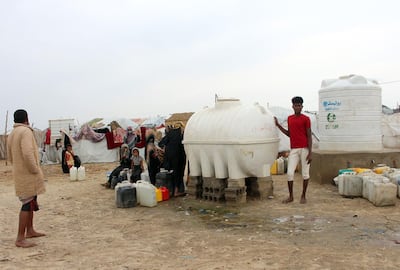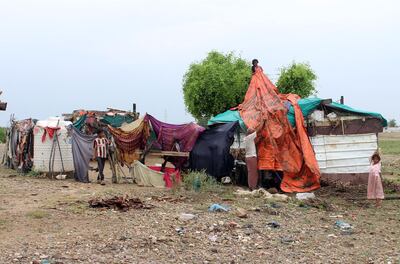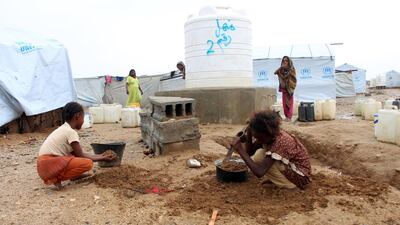Ahmed Abu Ibrahim walked for hours with his wife and six children, including his disabled daughter, carrying their belongings on their backs.
The recent escalation in fighting in northern Yemen’s Marib and Al Jawf over the last two weeks has already displaced over 1,000 families, including Mr Abu Ibrahim. Many of those who have left their homes are now living in schools and under canvas shelters in Sanaa and parts of Marib and Al Jawf provinces away from the frontlines.
But even after they've fled, many are not safe. The Houthi rebels shelled a refugee settlement in Nehim area east of the Sanaa on Sunday morning but inflicted no casualties.
In the mountainous north, many are now living in inadequate shelters in the middle of winter, having left most of their belongings behind.
Mr Abu Ibrahim and his family were in the Al Khanek camp when it was shelled by the rebels and so moved to another settlement in Al Meil area western Marib. Now they are sleeping under a sheet.
"We are still struggling to get a tent because as we arrived in the new camp we just made a handmade tent between two tents for other IDPs," he told The National from the camp. "We have no clean water, no toilets; you can say we are still living in the open."

He said that aid agencies visited the camp on Monday and provided basic supplies. “I hope they can provide us with clean water and mobile toilets, in addition to blankets, these are the most needed items here,” he said.
The United Nations Population Fund for Yemen reported on Tuesday that 6,300 people have been displaced by fighting around Saana, Marib and Al Jawf since January 19.
The agency reported that among those displaced there was an increase in emergency reproductive health cases and mobile teams have been supporting facilities carry out both normal births and caesarean sections.
It said that the urgent needs were still for food, clothing and protection.
But in the middle of the fighting, hundreds are still trapped between the frontlines.
"The fight is ramping up in Al Jawf and I am upset, I have my wife and my two children," Tariq Razzaz, a journalist working for the Yemeni TV in Al Jawf told The National. "I want to take them back home but until know, I couldn't find a safe corridor to get back to Taez province where my parents live."
The International Committee of the Red Cross (ICRC) in Yemen said that they are in touch with the local authorities and the other humanitarian actors in clashes areas to monitor the situation.
"We have backed the Yemen Red Crescent Society in Al-Jawf with a number of tents to respond to the urgent cases," the ICRC said on Tuesday. "Until yesterday, 40 tents – each tent accommodates 6 to 7 people – were distributed to 40 families," Fareed Al Humeid, a spokesperson for the ICRC in Sanaa told The National.

Local NGOs have also deployed to assist those fleeing the fighting.
"The situation in the war zones east of Sanaa and in the provinces of Marib and Al Jawf is really catastrophic," Ruqaia Ahmed, the head of a local NGO for relief works and development based in Sanaa told The National. "People there are starving, hundreds of children suffer malnutrition and diseases, especially those who were in IDPs camps and had to flee to other camps as the clashes reached the areas surrounding them."
People in many areas of Yemen were already facing a humanitarian crisis before the latest fighting.
Thousands were already facing famine and diseases such as cholera can spread through impoverished communities rapidly.
The Yemeni government has condemned the Houthi shelling of Al Khanek IDP camp and called upon the international relief organizations to intensify their work in the areas affected by fighting.
"The Houthi deliberate shelling of the IDP camp east of Sanaa is strongly condemned," head of the Supreme Relief Committee of the internationally recognised government, Jamal Balfakih, told The National. "They have been indiscriminately shelling the innocent people to aggravate the situation in areas under their control more and more."
Mr Balfakih called for more support for the thousands “living in a very critical situation.”
“Many organizations have started reacting with the situation there and today 23 trucks carrying medical supplies provided by King Salman Humanitarian Aid and Relief Centre just arrived in Marib province to be distributed to the new IDPs camps in the clashes zones,” Mr Balfakih said.

